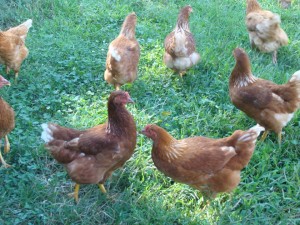Urban agriculture is nothing new, but as more people are searching for sustainable and local food sources, the movement is growing rapidly. Despite its growing popularity, urban agriculture sometimes bumps up against roadblocks along the way, such as local laws regarding agricultural activities in cities. One such law put an abrupt end to what looked to be a promising new project in Detroit this week.
On Thursday June 5, hedge fund manager Mark Spitznagel brought 18 baby goats (or kids) to Brightmoor, a blighted neighborhood in Detroit, Michigan. The goats were going to spend the summer grazing and clearing weeds from the area, and at the end of the summer they would be sold to local butchers and the proceeds of their meat would go back to the community. Spitznagel planned to hire unemployed local residents to herd the goats through the summer, and called his urban farming experiment the Idyll Farms Detroit project (named after Idyll Farms, his own farm in Northport Michigan, where he raises goats).
According to local officials, however, the goats could not stay. Detroit law currently prohibits goats grazing on public property (and keeping livestock in general). The kids were sent home by Saturday June 7, and will head to the butchers sooner than originally planned.

While not urban, a group of CELL students visited these goats while in Iceland.
Credit: Emily Siegel
This is a sad fate for the baby goats, but not all hope is lost. For one thing, it has sparked some important discussion about urban agriculture—and it seems that by and large, most are in favor of it. James Tate, a council member in Detroit, said in an interview with the New York Times that he is “huge on animal husbandry for neighborhoods with high vacancy rates,” and has been working for a year to make it so that goats, rabbits, bees, and chickens can roam on lots with a license. However, he is not so in favor of the Brightmoor project, because Spitznagel failed to ask for (let alone receive) any license or permission for his goats to roam.
On the contrary, Ron Paul, former presidential candidate and Republican politician, whole-heartedly agreed with Spitznagel’s goat project. In a video posted to his website on June 9, he said that “the goats are doing a better job than the politicians are doing” at cleaning up the city, and urged viewers to contact Mike Duggan, mayor of Detroit, and express their support for the goats. His enthusiasm for the project was more concerned with cleaning up the city in a cheap and effective way, however. When he described the urban agriculture portion of the project, he said, “[Spitznagel] thinks there should be urban farming. Who ever heard of such a thing? Cities are for factories and buildings and concrete.”
Though he may support the goats, to many urban farmers, Paul is wrong on that front. Increasingly, cities are less for factories and buildings and concrete, and more for tomatoes and lettuce and, well, goats. In cities across the country, people are not only working on urban agriculture projects, but they are also working on making them legal (especially when it comes to livestock). Organizations such as the Goat Justice League and Backyard Chickens are working to help people cooperate with their communities in raising urban livestock. Many others are also joining the discussion, offering advice on how to start an urban livestock movement in your area.

Many cities limit a flock of backyard chickens to 3, but others let you have as many as you can handle.
So what should you do if you’re thinking about adding a small flock or herd to your urban backyard? First, don’t make Spitznagel’s mistake, and check to see if it’s legal in your city. If it’s not, see what you can do to change that—rally community support and convince the local government of the benefits of urban agriculture and livestock. Most importantly, though, ask your neighbors. They’ll be the first ones to complain if they see the animals as a nuisance. Explain to them why you want to raise urban livestock, and maybe even offer up some of the eggs or honey or goat’s milk. After all, community is the key to sustainability, and sharing is the key to community.
By Jessica Edington
